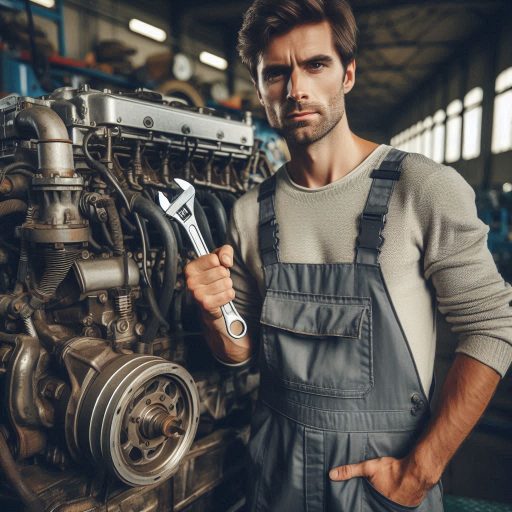Introduction
Industrial machinery mechanics are professionals who maintain and repair machinery used in manufacturing and other industrial settings.
They ensure that equipment operates efficiently and reliably, addressing issues before they lead to major breakdowns.
This role involves troubleshooting mechanical problems, performing routine maintenance, and replacing worn or damaged parts.
The importance of industrial machinery mechanics spans across various industries.
They are crucial in manufacturing, where machinery uptime is essential for production efficiency.
Without these mechanics, factories would face frequent equipment failures, leading to costly production delays and reduced output.
In sectors like agriculture, construction, and energy, machinery mechanics keep essential equipment running smoothly, from tractors to power generators.
Mechanics also play a vital role in reducing operational costs.
By performing regular maintenance and timely repairs, they prevent major malfunctions that could lead to expensive repairs or replacements.
Their work helps maintain high productivity levels, ensuring that industries can meet production demands without interruptions.
Basically, industrial machinery mechanics are indispensable to many industries.
They contribute to operational efficiency, cost savings, and overall productivity by ensuring machinery operates at its best.
Their expertise helps prevent downtime and maintains the smooth functioning of critical industrial processes.
This crucial role underscores the significance of their contributions across diverse sectors.
Job duties and responsibilities of Industrial Machinery Mechanics
Industrial machinery mechanics play a crucial role in ensuring the proper functioning of machinery within manufacturing plants, construction sites, and other industrial settings.
These skilled professionals are responsible for a variety of tasks that help keep machinery running smoothly and efficiently.
Inspecting, maintaining, and repairing industrial machinery
One of the primary responsibilities of industrial machinery mechanics is to inspect machinery regularly to identify any potential issues or signs of wear and tear.
They are trained to diagnose mechanical problems and perform repairs as needed to prevent breakdowns and disruptions in production.
Industrial machinery mechanics are also responsible for performing routine maintenance tasks, such as lubricating moving parts, replacing worn components, and calibrating machinery to ensure optimal performance.
By staying on top of maintenance schedules, these professionals help extend the lifespan of machinery and reduce the risk of costly repairs.
Troubleshooting mechanical issues and performing necessary repairs
When machinery malfunctions or breaks down, industrial machinery mechanics are called upon to troubleshoot the problem and determine the root cause of the issue.
They use a variety of tools and diagnostic techniques to identify the source of mechanical failures and develop a plan for repair.
Industrial machinery mechanics are skilled in repairing and replacing damaged components, such as gears, belts, and bearings.
They are trained to work on a wide range of machinery, from conveyor systems and production lines to hydraulic equipment and robotics.
By quickly addressing mechanical issues, these professionals help minimize downtime and keep operations running smoothly.
Performing preventive maintenance tasks to ensure machinery efficiency
Preventive maintenance is a critical aspect of the work carried out by industrial machinery mechanics.
By conducting regular inspections and implementing maintenance schedules, these professionals can prevent unexpected breakdowns and costly repairs.
Industrial machinery mechanics are trained to identify potential issues before they escalate into major problems.
By replacing worn parts, cleaning machinery components, and adjusting settings, these professionals help improve the efficiency and reliability of industrial equipment.
Preventive maintenance also helps reduce energy consumption and prolong the lifespan of machinery, saving companies time and money in the long run.
Industrial machinery mechanics play a vital role in ensuring the smooth operation of industrial equipment.
By inspecting, maintaining, and repairing machinery, these professionals help minimize downtime, reduce repair costs, and improve overall efficiency.
Their expertise is essential for businesses looking to maintain a competitive edge in today’s fast-paced industrial landscape.
Read: Online Courses for Surveying and Mapping Technicians
Skills and qualifications required for Industrial Machinery Mechanics
Technical skills in diagnosing and repairing machinery
A core requirement for industrial machinery mechanics is their ability to diagnose and repair machinery effectively.
They need to have a comprehensive understanding of complex machinery systems and components to troubleshoot issues accurately.
This includes the ability to analyze mechanical, electrical, and hydraulic systems to identify problems and implement solutions.
In addition, industrial machinery mechanics must be proficient in using a variety of tools and equipment to perform repairs, such as wrenches, screwdrivers, and diagnostic devices.
Having strong technical skills enables industrial machinery mechanics to address mechanical issues promptly and minimize downtime, ensuring the efficiency and productivity of the machinery they work on.
Knowledge of safety protocols and regulations
Safety is paramount in the field of industrial machinery mechanics.
Industrial machinery mechanics must have a thorough understanding of safety protocols and regulations to protect themselves and others in the workplace.
This includes following safety procedures when working with machinery, wearing appropriate personal protective equipment, and adhering to industry-specific safety standards.
By being well-versed in safety protocols, industrial machinery mechanics can prevent accidents and injuries, creating a secure and healthy work environment.
Moreover, being knowledgeable about safety regulations enables industrial machinery mechanics to comply with legal requirements and industry standards, ensuring the proper maintenance and operation of machinery.
Ability to read blueprints and technical manuals
Another essential skill for industrial machinery mechanics is the ability to read blueprints and technical manuals.
Blueprints provide detailed diagrams and specifications of machinery components, while technical manuals offer instructions for assembly, disassembly, and repair.
Industrial machinery mechanics must be proficient in interpreting blueprints and manuals to understand the structure and function of machinery accurately.
By being able to read blueprints and technical manuals effectively, industrial machinery mechanics can follow instructions precisely, assemble machinery correctly, and troubleshoot issues efficiently.
This skill is crucial for ensuring that machinery operates smoothly and meets performance standards, contributing to the overall efficiency and effectiveness of industrial operations.
Possessing the necessary skills and qualifications is essential for industrial machinery mechanics to succeed in their profession.
By having technical skills in diagnosing and repairing machinery, knowledge of safety protocols and regulations.
And the ability to read blueprints and technical manuals, industrial machinery mechanics can perform their duties proficiently and contribute to the smooth operation of machinery in various industries.
Continuous training and development in these areas are key for industrial machinery mechanics to keep up with technological advancements and industry standards, ensuring their competence and relevance in the ever-evolving field of industrial machinery maintenance and repair.
Read: Surveying and Mapping Technician: Job Satisfaction
Job outlook for Industrial Machinery Mechanics
Growth in demand for Industrial Machinery Mechanics
The job outlook for industrial machinery mechanics is promising, with growing demand across various industries.
As manufacturing processes become more complex, the need for skilled technicians increases.
Automation and advanced machinery drive this demand, requiring more maintenance and repair work.
Industries such as automotive, aerospace, and energy rely heavily on machinery, ensuring a steady need for mechanics.
Additionally, the rise of smart technologies and Industry 4.0 introduces new machinery that needs specialized maintenance.
The aging workforce in this field also contributes to the demand for new talent.
Overall, the outlook remains strong, offering job stability and opportunities for skilled professionals.
Opportunities for Career Advancement and Specialization
Career advancement and specialization opportunities abound for industrial machinery mechanics.
With experience, mechanics can move into supervisory or management roles, overseeing maintenance teams.
Specialization in areas such as robotics, automation, or HVAC systems opens new career paths.
Advanced training and certifications can lead to roles like maintenance engineers or reliability engineers.
Mechanics may also choose to become experts in specific types of machinery or industries.
Specialized skills can lead to consulting opportunities or higher-level technical roles.
Continuous learning and adapting to new technologies will enhance career prospects and lead to more advanced positions in the field.
Expected Salary Range for Industrial Machinery Mechanics
The salary range for industrial machinery mechanics varies based on experience, location, and industry.
On average, mechanics earn between $50,000 and $70,000 per year.
Entry-level positions typically start at around $40,000 annually, while experienced professionals can earn up to $80,000 or more.
Mechanics working in specialized fields or regions with high demand may earn higher salaries.
For instance, those with advanced skills in automation or robotics often receive premium compensation.
Additional benefits such as overtime pay, bonuses, and comprehensive health plans can further enhance overall earnings.
As the demand for skilled technicians continues to grow, salaries are expected to remain competitive and potentially increase.
The job outlook for industrial machinery mechanics is strong, with increasing demand driven by technological advancements and industry growth.
Career advancement and specialization offer numerous opportunities for professional development.
The expected salary range is competitive, with potential for higher earnings based on experience and specialization.
The field promises stability and growth, making it an attractive career choice for those interested in machinery and maintenance.
Read: Importance of Accuracy in Surveying and Mapping

See Related Content: Specializations Within the Mining Engineering Career
Uncover the Details: Internship Tips for Aspiring Drafter Engineers
Training and education requirements for becoming an Industrial Machinery Mechanic
Options for Obtaining Training
Industrial machinery mechanics have several options for obtaining training, crucial for entering and advancing in the field.
Vocational schools offer specialized programs that provide foundational knowledge and practical skills.
These programs typically include hands-on training with machinery, which is essential for understanding equipment operation and maintenance.
Many vocational schools partner with industry leaders to offer up-to-date training aligned with current technological advancements.
Apprenticeships also play a key role in training.
Apprenticeships combine classroom instruction with on-the-job training, allowing mechanics to learn while gaining practical experience.
These programs often involve working under the guidance of experienced professionals, providing valuable insights into real-world challenges.
Apprenticeships can last from one to four years, depending on the complexity of the skills being taught.
Completing an apprenticeship can lead to immediate employment and career advancement opportunities.
Importance of Hands-On Experience
Hands-on experience is critical for industrial machinery mechanics.
Working directly with machinery helps develop problem-solving skills and technical proficiency.
Experience allows mechanics to become familiar with the operation of various equipment and understand how to address issues effectively.
Practical experience helps in diagnosing problems quickly and accurately, which is crucial for minimizing downtime and ensuring smooth operations.
In addition, hands-on experience builds confidence and enhances troubleshooting skills.
Mechanics learn how to handle unexpected issues and make repairs efficiently.
Practical work experience also provides insights into the nuances of different machinery types and industries, which theoretical knowledge alone cannot offer.
Thus, the ability to apply learned skills in real-world situations is indispensable for career success in this field.
Certification Options for Industrial Machinery Mechanics
Certification can further enhance a mechanic’s career prospects and job security.
Several certification options are available for industrial machinery mechanics, each focusing on different aspects of the field. The most common certifications include:
- Certified Maintenance & Reliability Technician (CMRT): This certification demonstrates proficiency in maintenance and reliability practices, crucial for effective machinery management.
- Certified Industrial Maintenance Mechanic (CIMM): Offered by various organizations, this certification focuses on technical skills and knowledge related to industrial maintenance.
- Maintenance and Lubrication Technician (MLT): This certification is for mechanics specializing in lubrication techniques, which are essential for machinery longevity and performance.
Obtaining certification can open doors to advanced positions and higher salaries.
It also signifies a commitment to professional development and adherence to industry standards.
Employers often value certification as it reflects a mechanic’s dedication to maintaining high performance and safety standards.
Obtaining training through vocational schools or apprenticeships provides a solid foundation for a career in industrial machinery maintenance.
Hands-on experience is vital for developing practical skills and confidence.
Additionally, pursuing relevant certifications can enhance career prospects and demonstrate a commitment to professional excellence.
Transform Your Career Today
Unlock a personalized career strategy that drives real results. Get tailored advice and a roadmap designed just for you.
Start NowRead: Field vs. Office Work in Surveying and Mapping
Challenges faced by Industrial Machinery Mechanics
Physical Demands of the Job
Industrial machinery mechanics face significant physical demands in their daily work.
The job often requires lifting heavy parts and tools.
Mechanics must frequently crouch, bend, or kneel to access machinery components.
These physical tasks can lead to fatigue and strain over time.
Good physical fitness is essential to handle these demands and prevent injury.
Regular exercise and stretching can help maintain physical health and resilience.
Working in Various Environments and Conditions
Industrial machinery mechanics work in a variety of environments and conditions.
They may find themselves in factories, workshops, or outdoor settings.
The work environment can range from clean and controlled areas to dusty and noisy spaces.
Mechanics must adapt to different temperatures and humidity levels, depending on the location of the machinery.
This variability requires flexibility and the ability to work effectively in diverse conditions.
Dealing with Tight Deadlines and Pressure
Mechanics often face tight deadlines and significant pressure to keep machinery running smoothly.
When machinery breaks down, production schedules can be severely impacted.
Mechanics must quickly diagnose and repair issues to minimize downtime.
The pressure to resolve problems swiftly can be intense, especially in high-stakes environments like manufacturing plants.
Effective time management and problem-solving skills are crucial for handling these pressures.
Mechanics must remain calm under stress and prioritize tasks efficiently.
The role of an industrial machinery mechanic involves managing physical demands, adapting to various working environments, and handling pressure from tight deadlines.
The job requires physical strength, flexibility, and resilience.
Working conditions can vary greatly, from controlled environments to challenging conditions.
Mechanics must be prepared to face these challenges and perform effectively under pressure.
See Related Content: Understanding Agricultural Engineering Job Roles
Conclusion
Industrial machinery mechanics play a critical role in the workforce by ensuring machinery operates smoothly and efficiently.
Their expertise supports manufacturing, construction, and various industries reliant on complex equipment.
They perform essential tasks, including maintenance, repair, and troubleshooting, which keep operations running smoothly and prevent costly downtime.
The demand for skilled industrial machinery mechanics remains strong.
As technology advances, the need for mechanics who can handle sophisticated machinery and automated systems increases.
Their ability to adapt to new technologies and methods ensures their relevance in an evolving job market.
For individuals interested in pursuing a career as an industrial machinery mechanic, the outlook is promising.
This field offers stability, as skilled mechanics are essential for many industries.
Career opportunities abound in manufacturing plants, maintenance services, and industrial facilities.
Aspiring mechanics should consider gaining formal education and hands-on experience to build a solid foundation.
Certification programs and apprenticeships provide valuable training and enhance employability.
Staying updated with industry trends and technological advancements will also help you remain competitive.
In summary, industrial machinery mechanics are vital to various industries, ensuring machinery runs efficiently.
[E-Books for Sale]
The Big Book of 500 High-Paying Jobs in America: Unlock Your Earning Potential
$19.99 • 500 High-Paying Jobs • 330 pages
Explore 500 high-paying jobs in America and learn how to boost your career, earn more, and achieve success!
See All 500 High-Paying Jobs of this E-Book
1001 Professions Without a Degree: High-Paying American Jobs You Can Start Now
$19.99 • 1001 Professions Without a Degree • 174 pages
Discover 1001 high-paying jobs without a degree! Unlock career tips, skills, and success strategies for just $19.99!




